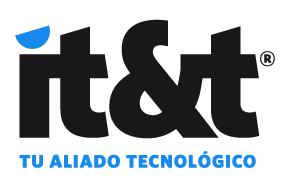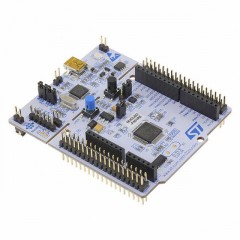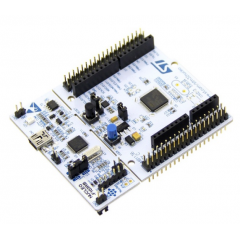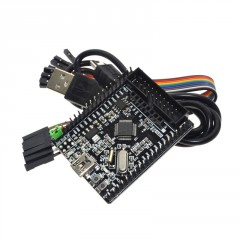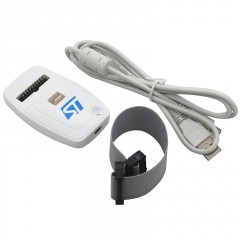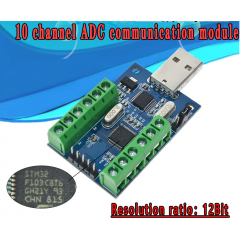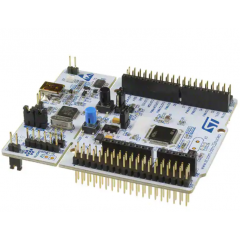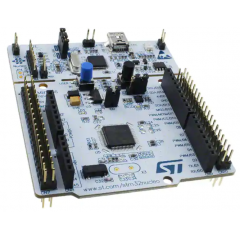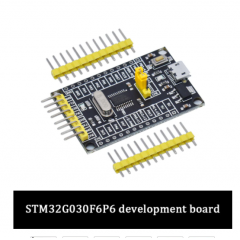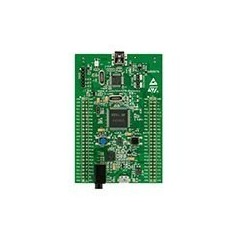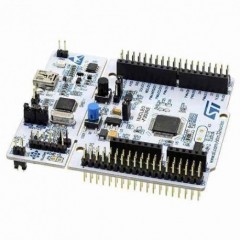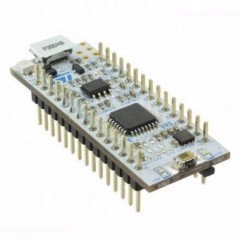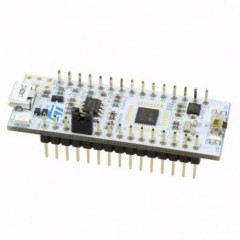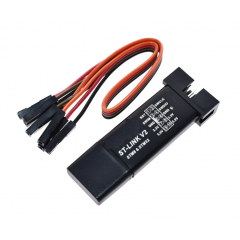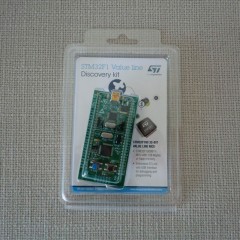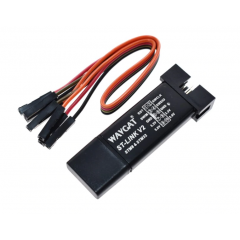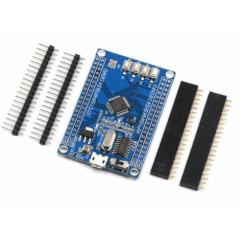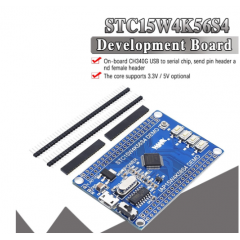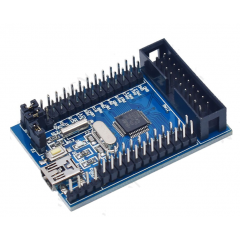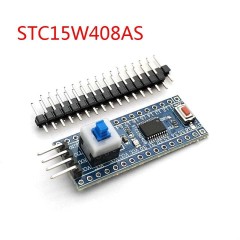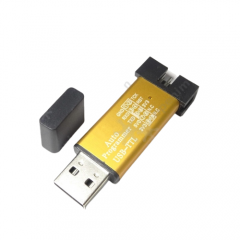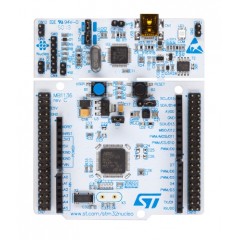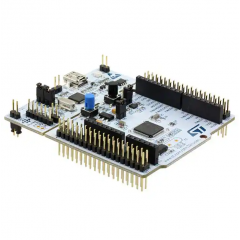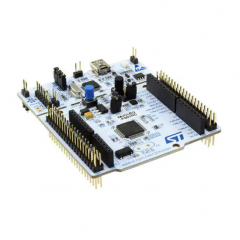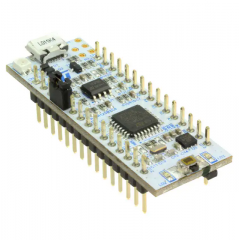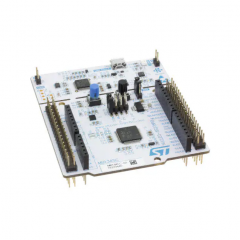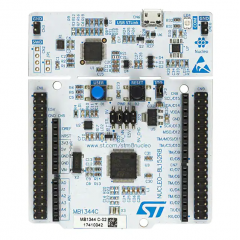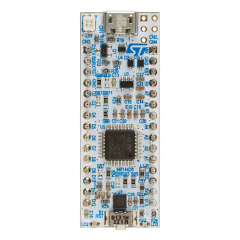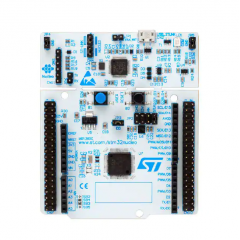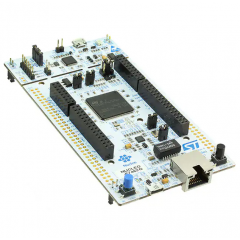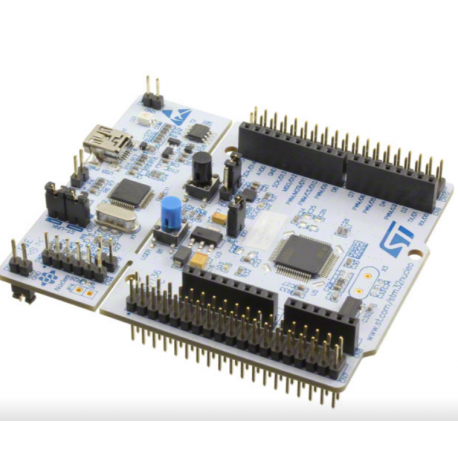 Ver más grande
Ver más grande
Nucleo-l476rg Stm32l476rg Stm32 Cortex M4 Arm Itytarg
09831
Nuevo producto
Cod: KDY
Tipo: NUCLEO-L476RG
Marca: STMicroelectronics
Referencia: NUCLEOL476RG / STM / ROBOTICA / PROGRAMACION / DESARROLLO
PRODUCTO SIN SOPORTE
1 Elemento
Advertencia: ¡Últimos artículos en stock!
Más
Hardware
The STM32L476RG SoC provides the following hardware IPs:
- Ultra-low-power with FlexPowerControl (down to 130 nA Standby mode and 100 uA/MHz run mode)
- Core: ARM® 32-bit Cortex®-M4 CPU with FPU, frequency up to 80 MHz, 100DMIPS/1.25DMIPS/MHz (Dhrystone 2.1)
- Clock Sources:
- 4 to 48 MHz crystal oscillator
- 32 kHz crystal oscillator for RTC (LSE)
- Internal 16 MHz factory-trimmed RC ( ±1%)
- Internal low-power 32 kHz RC ( ±5%)
- Internal multispeed 100 kHz to 48 MHz oscillator, auto-trimmed by LSE (better than ±0.25 % accuracy)
- 3 PLLs for system clock, USB, audio, ADC
- RTC with HW calendar, alarms and calibration
- LCD 8 x 40 or 4 x 44 with step-up converter
- Up to 24 capacitive sensing channels: support touchkey, linear and rotary touch sensors
- 16x timers:
- 2x 16-bit advanced motor-control
- 2x 32-bit and 5x 16-bit general purpose
- 2x 16-bit basic
- 2x low-power 16-bit timers (available in Stop mode)
- 2x watchdogs
- SysTick timer
- Up to 114 fast I/Os, most 5 V-tolerant, up to 14 I/Os with independent supply down to 1.08 V
- Memories
- Up to 1 MB Flash, 2 banks read-while-write, proprietary code readout protection
- Up to 128 KB of SRAM including 32 KB with hardware parity check
- External memory interface for static memories supporting SRAM, PSRAM, NOR and NAND memories
- Quad SPI memory interface
- 4x digital filters for sigma delta modulator
- Rich analog peripherals (independent supply)
- 3x 12-bit ADC 5 MSPS, up to 16-bit with hardware oversampling, 200 uA/MSPS
- 2x 12-bit DAC, low-power sample and hold
- 2x operational amplifiers with built-in PGA
- 2x ultra-low-power comparators
- 18x communication interfaces
- USB OTG 2.0 full-speed, LPM and BCD
- 2x SAIs (serial audio interface)
- 3x I2C FM+(1 Mbit/s), SMBus/PMBus
- 6x USARTs (ISO 7816, LIN, IrDA, modem)
- 3x SPIs (4x SPIs with the Quad SPI)
- CAN (2.0B Active) and SDMMC interface
- SWPMI single wire protocol master I/F
- 14-channel DMA controller
- True random number generator
- CRC calculation unit, 96-bit unique ID
- Development support: serial wire debug (SWD), JTAG, Embedded Trace Macrocell™
More information about STM32L476RG can be found here:
Supported Features
The Zephyr nucleo_l476rg board configuration supports the following hardware features:
| Interface | Controller | Driver/Component |
|---|---|---|
| NVIC | on-chip | nested vector interrupt controller |
| UART | on-chip | serial port-polling; serial port-interrupt |
| PINMUX | on-chip | pinmux |
| GPIO | on-chip | gpio |
| I2C | on-chip | i2c |
| PWM | on-chip | pwm |
| SPI | on-chip | spi |
Other hardware features are not yet supported on this Zephyr port.
The default configuration can be found in the defconfig file: boards/arm/nucleo_l476rg/nucleo_l476rg_defconfig
Connections and IOs
Nucleo L476RG Board has 8 GPIO controllers. These controllers are responsible for pin muxing, input/output, pull-up, etc.
Default Zephyr Peripheral Mapping:
- UART_1_TX : PA9
- UART_1_RX : PA10
- UART_2_TX : PA2
- UART_2_RX : PA3
- UART_3_TX : PB10
- UART_3_RX : PB11
- I2C_1_SCL : PB6
- I2C_1_SDA : PB7
- SPI_1_NSS : PA4
- SPI_1_SCK : PB3
- SPI_1_MISO : PA6
- SPI_1_MOSI : PA7
- SPI_2_NSS : PB12
- SPI_2_SCK : PB13
- SPI_2_MISO : PB14
- SPI_2_MOSI : PB15
- SPI_3_NSS : PB12
- SPI_3_SCK : PC10
- SPI_3_MISO : PC11
- SPI_3_MOSI : PC12
- PWM_2_CH1 : PA0
- USER_PB : PC13
- LD2 : PA5
System Clock
Nucleo L476RG System Clock could be driven by internal or external oscillator, as well as main PLL clock. By default System clock is driven by PLL clock at 80MHz, driven by 16MHz high speed internal oscillator.
Serial Port
Nucleo L476RG board has 6 U(S)ARTs. The Zephyr console output is assigned to UART2. Default settings are 115200 8N1.
Programming and Debugging
Applications for the nucleo_l476rg board configuration can be built and flashed in the usual way (see Build an Application and Run an Application for more details).
Flashing
Nucleo L476RG board includes an ST-LINK/V2-1 embedded debug tool interface. This interface is supported by the openocd version included in the Zephyr SDK since v0.9.2.
Flashing an application to Nucleo L476RG
Connect the Nucleo L476RG to your host computer using the USB port. Then build and flash an application. Here is an example for the Hello World application.
Run a serial host program to connect with your Nucleo board:
Features
• Common features
– STM32 microcontroller in LQFP64 package
– 1 user LED shared with Arduino™
– 1 user and 1 reset push-buttons
– 32.768 kHz crystal oscillator
– Board connectors:
◦ Arduino™ Uno V3 expansion connector
◦ ST morpho extension pin headers for full access to all STM32 I/Os
– Flexible power-supply options: ST-LINK, USB VBUS or external sources
– On-board ST-LINK debugger/programmer with USB re-enumeration
capability: mass storage, Virtual COM port and debug port
– Comprehensive free software libraries and examples available with the
STM32Cube MCU Package
– Support of a wide choice of Integrated Development Environments (IDEs)
including IAR™, Keil® and GCC-based IDEs
• Board-specific features
– External SMPS to generate Vcore logic supply
– 24 MHz HSE
– Board connectors:
◦ External SMPS experimentation dedicated connector
◦ Micro-AB or Mini-AB USB connector for the ST-LINK
◦ MIPI® debug connector
– Arm® Mbed Enabled™ compliant
Description
The STM32 Nucleo-64 boards provide an affordable and flexible way for users to try out new concepts and build prototypes by choosing from the various combinations of performance and power consumption features, provided by the STM32 microcontroller. For the compatible boards, the external SMPS significantly reduces power consumption in Run mode. The Arduino™ Uno V3 connectivity support and the ST morpho headers allow the easy expansion of the functionality of the STM32 Nucleo open development platform with a wide choice of specialized shields. The STM32 Nucleo-64 board does not require any separate probe as it integrates the ST-LINK debugger/programmer. The STM32 Nucleo-64 board comes with the STM32 comprehensive free software libraries and examples available with the STM32Cube MCU Package.
